















NRI Schools |
|---|
|
| Topic Navigation |
|---|
|
Wikipedia: National Radio Institute
Page Sections History Images |
History
The following section is an excerpt from Wikipedia's National Radio Institute page on 4 May 2020, text available via the Creative Commons Attribution-ShareAlike 3.0 Unported License.
By the second half of the 1960s, NRI recognized that its limited resources would preclude it from maintaining its leadership position within the industry in the coming decade. James Morrison Smith thus set out to find a partner/buyer. In 1968, McGraw-Hill Education agreed to purchase NRI, after having bought the correspondence division (20%) of Capitol Radio Engineering Institute in 1964. By this time, over one million students had completed an NRI course. McGraw-Hill had anticipated this would open a new market for technical books, while NRI hoped a significant advantage to the acquisition would be their ability to utilize the vast technical publishing resources of its new owner. The McGraw-Hill name began appearing in the NRI Journal in 1970. It was 1973 when the McGraw-Hill name began appearing in catalogues of copyright entries for NRI courses in the U. S. Library of Congress, and 1974 when it started to appear in magazine advertisements. After completion of the deal, the school was renamed once again to NRI Schools, and became part of a newly established McGraw-Hill Continuing Education Center.
The founder, James E. Smith, remained as NRI Schools chairman until his death in 1973 while his son, James Morrison Smith, continued to serve as president, a post he had held since 1956. After James E. Smith's death in September 1973 and his son's semi-retirement2 at the end of that same year (fully retiring in 1976), John F. ("Jack") Thompson (1931–2015), who joined NRI in 1955, became president and CEO of NRI Schools and a senior vice-president of the McGraw-Hill Continuing Education Center, staying in those roles until his retirement in 1984. Thompson was succeeded by Edward B. "Ted" Beach (1934–1999), who was appointed director of the education department at McGraw Hill's Continuing Education Center. Beach retired in 1989 after 28 years of service with NRI. The last director/general manager of the school was Nick Maruhnich (born 1951), who was a senior vice president of special projects at the McGraw-Hill Companies and general manager of the McGraw-Hill Continuing Education Center - NRI Schools.
By the mid-1980s, NRI Schools' average annual student enrollment had peaked to around 60,000, a substantial increase over the 38,000 a few years earlier. NRI Schools claimed to be the first organization to educate students on a digital computer with training software and to use multimedia computers and the Web to familiarize students with cutting-edge technology. Under McGraw-Hill's management, the school also branched out into many other training fields, including computer repair, as discussed in the introductory section. However, by the 1990s irreversible economic and technological developments had unfolded that adversely affected the business. Ultimately, NRI Schools succumbed to these market forces.
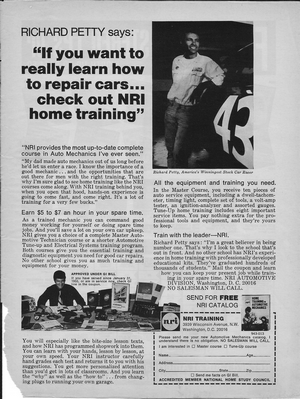 |
Subject: Richard Petty NRI Schools Advertisement
View photo of Richard Petty NRI Schools Advertisement - 5.5MB |
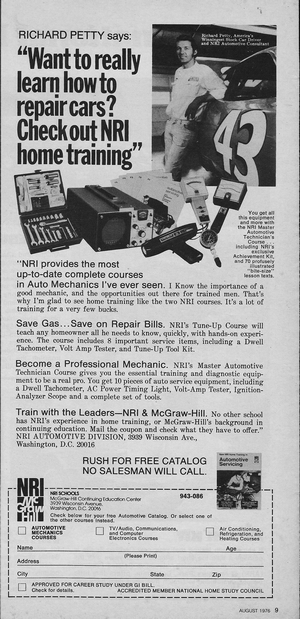 |
Subject: Richard Petty NRI Schools Advertisement
Source: Motor Trend Date: August 1976 View photo of Richard Petty NRI Schools Advertisement - 3.6MB |
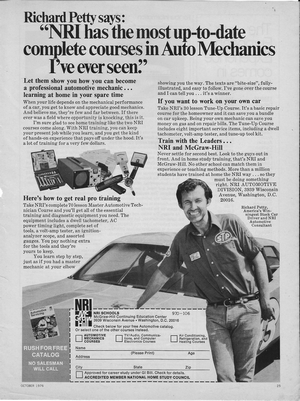 |
Subject: Richard Petty NRI Schools Advertisement
Source: Car and Driver Date: October 1976 View photo of Richard Petty NRI Schools Advertisement - 5.7MB |
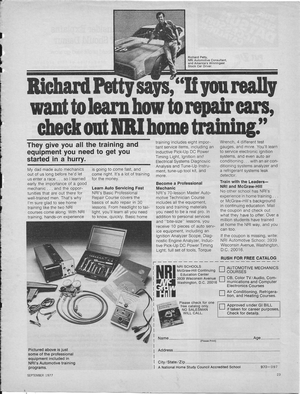 |
Subject: Richard Petty NRI Schools Advertisement
Source: Car and Driver Date: September 1977 View photo of Richard Petty NRI Schools Advertisement - 5.8MB |
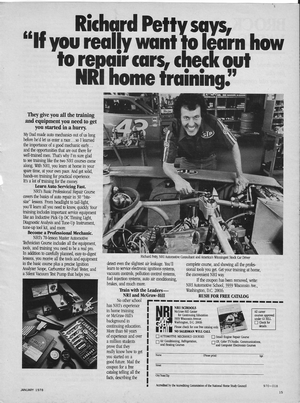 |
Subject: Richard Petty NRI Schools Advertisement
Source: Car and Driver Date: January 1978 View photo of Richard Petty NRI Schools Advertisement - 5.8MB |
